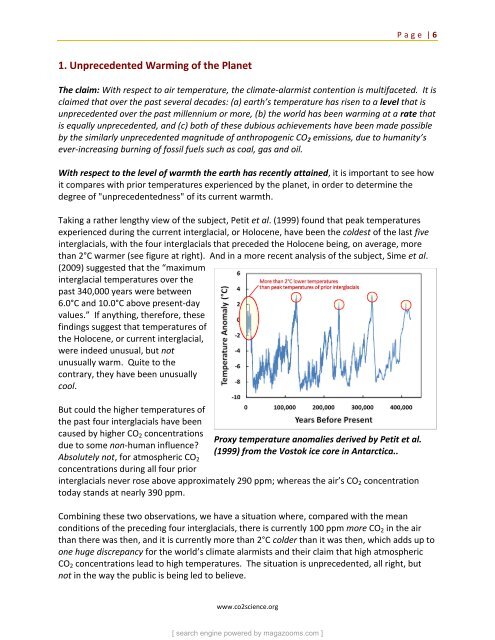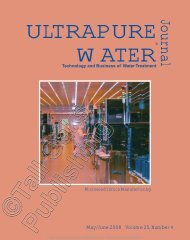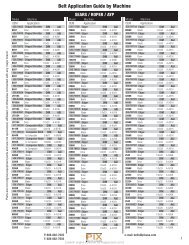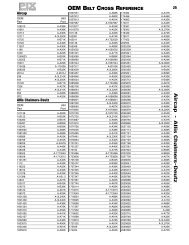Carbon Dioxide and Earth's Future Pursuing the ... - Magazooms
Carbon Dioxide and Earth's Future Pursuing the ... - Magazooms
Carbon Dioxide and Earth's Future Pursuing the ... - Magazooms
You also want an ePaper? Increase the reach of your titles
YUMPU automatically turns print PDFs into web optimized ePapers that Google loves.
1. Unprecedented Warming of <strong>the</strong> Planet<br />
www.co2science.org<br />
P a g e | 6<br />
The claim: With respect to air temperature, <strong>the</strong> climate-alarmist contention is multifaceted. It is<br />
claimed that over <strong>the</strong> past several decades: (a) earth’s temperature has risen to a level that is<br />
unprecedented over <strong>the</strong> past millennium or more, (b) <strong>the</strong> world has been warming at a rate that<br />
is equally unprecedented, <strong>and</strong> (c) both of <strong>the</strong>se dubious achievements have been made possible<br />
by <strong>the</strong> similarly unprecedented magnitude of anthropogenic CO2 emissions, due to humanity’s<br />
ever-increasing burning of fossil fuels such as coal, gas <strong>and</strong> oil.<br />
With respect to <strong>the</strong> level of warmth <strong>the</strong> earth has recently attained, it is important to see how<br />
it compares with prior temperatures experienced by <strong>the</strong> planet, in order to determine <strong>the</strong><br />
degree of "unprecedentedness" of its current warmth.<br />
Taking a ra<strong>the</strong>r lengthy view of <strong>the</strong> subject, Petit et al. (1999) found that peak temperatures<br />
experienced during <strong>the</strong> current interglacial, or Holocene, have been <strong>the</strong> coldest of <strong>the</strong> last five<br />
interglacials, with <strong>the</strong> four interglacials that preceded <strong>the</strong> Holocene being, on average, more<br />
than 2°C warmer (see figure at right). And in a more recent analysis of <strong>the</strong> subject, Sime et al.<br />
(2009) suggested that <strong>the</strong> “maximum<br />
interglacial temperatures over <strong>the</strong><br />
past 340,000 years were between<br />
6.0°C <strong>and</strong> 10.0°C above present-day<br />
values.” If anything, <strong>the</strong>refore, <strong>the</strong>se<br />
findings suggest that temperatures of<br />
<strong>the</strong> Holocene, or current interglacial,<br />
were indeed unusual, but not<br />
unusually warm. Quite to <strong>the</strong><br />
contrary, <strong>the</strong>y have been unusually<br />
cool.<br />
But could <strong>the</strong> higher temperatures of<br />
<strong>the</strong> past four interglacials have been<br />
caused by higher CO2 concentrations<br />
due to some non-human influence?<br />
Absolutely not, for atmospheric CO2<br />
concentrations during all four prior<br />
Proxy temperature anomalies derived by Petit et al.<br />
(1999) from <strong>the</strong> Vostok ice core in Antarctica..<br />
interglacials never rose above approximately 290 ppm; whereas <strong>the</strong> air’s CO2 concentration<br />
today st<strong>and</strong>s at nearly 390 ppm.<br />
Combining <strong>the</strong>se two observations, we have a situation where, compared with <strong>the</strong> mean<br />
conditions of <strong>the</strong> preceding four interglacials, <strong>the</strong>re is currently 100 ppm more CO2 in <strong>the</strong> air<br />
than <strong>the</strong>re was <strong>the</strong>n, <strong>and</strong> it is currently more than 2°C colder than it was <strong>the</strong>n, which adds up to<br />
one huge discrepancy for <strong>the</strong> world’s climate alarmists <strong>and</strong> <strong>the</strong>ir claim that high atmospheric<br />
CO2 concentrations lead to high temperatures. The situation is unprecedented, all right, but<br />
not in <strong>the</strong> way <strong>the</strong> public is being led to believe.<br />
[ search engine powered by magazooms.com ]

















